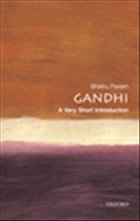Gandhi (1869-1948) was one of the few men in history to fight simultaneously on moral, religious, political, social, economic, and cultural fronts. During his time as a lawyer in South Africa he developed his strategy of non-violence: the idea of opposing unjust laws by non-violent protest, which he made the basis of his successful struggle against British rule in India. In this Very Short Introduction to Gandhi's life and thought, Bhikhu Parekh outlines both Gandhi's major philosophical insights and the limitations of his thought. He looks at Gandhi's cosmocentric anthropology, his spiritual view of politics, his unique form of liberal communitarianism, and his theories of oppression, non-violent action, and active citizenship. He also considers how the success of Gandhi's principles was limited by his lack of coherent theories of evil, and of state and power, and how his hostility to modern civilization impeded his appreciation of its complexity. Gandhi's life and thought has had an enormous impact both within and outside India, and he continues to be widely revered, as one of the greatest moral and political leaders of the twentieth century.
Mohandas Karamchand Gandhi (1869-1948) was one of the few men in history to fight simultaneously on moral, religious, political, social, economic, and cultural fronts. His life and thought has had an enormous impact on the Indian nation, and he continues to be widely revered - known before and after his death by assassination as Mahatma, the Great Soul.
Hinweis: Dieser Artikel kann nur an eine deutsche Lieferadresse ausgeliefert werden.
Mohandas Karamchand Gandhi (1869-1948) was one of the few men in history to fight simultaneously on moral, religious, political, social, economic, and cultural fronts. His life and thought has had an enormous impact on the Indian nation, and he continues to be widely revered - known before and after his death by assassination as Mahatma, the Great Soul.
Hinweis: Dieser Artikel kann nur an eine deutsche Lieferadresse ausgeliefert werden.

